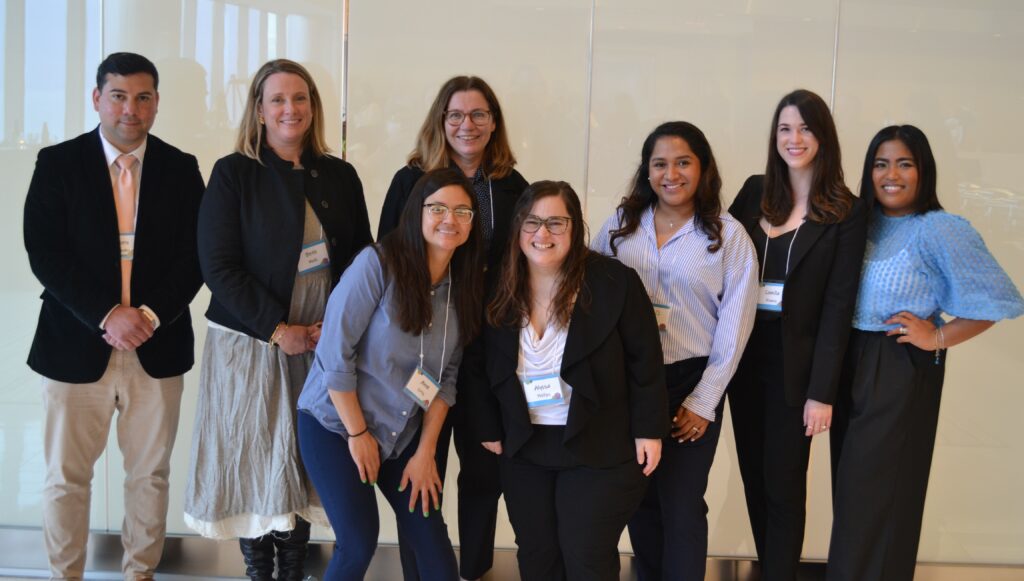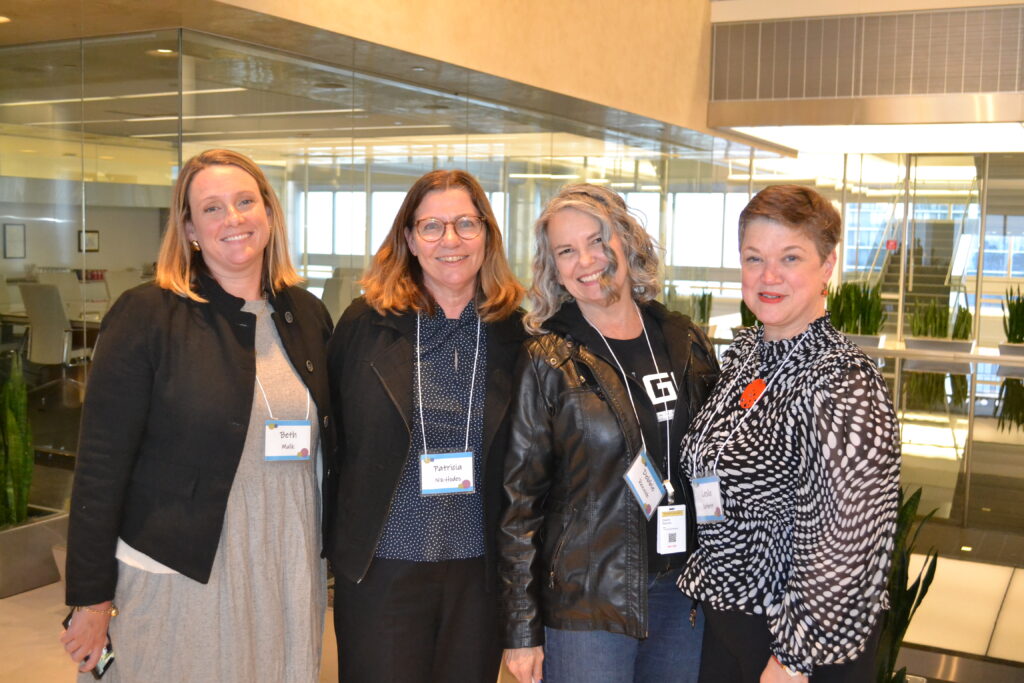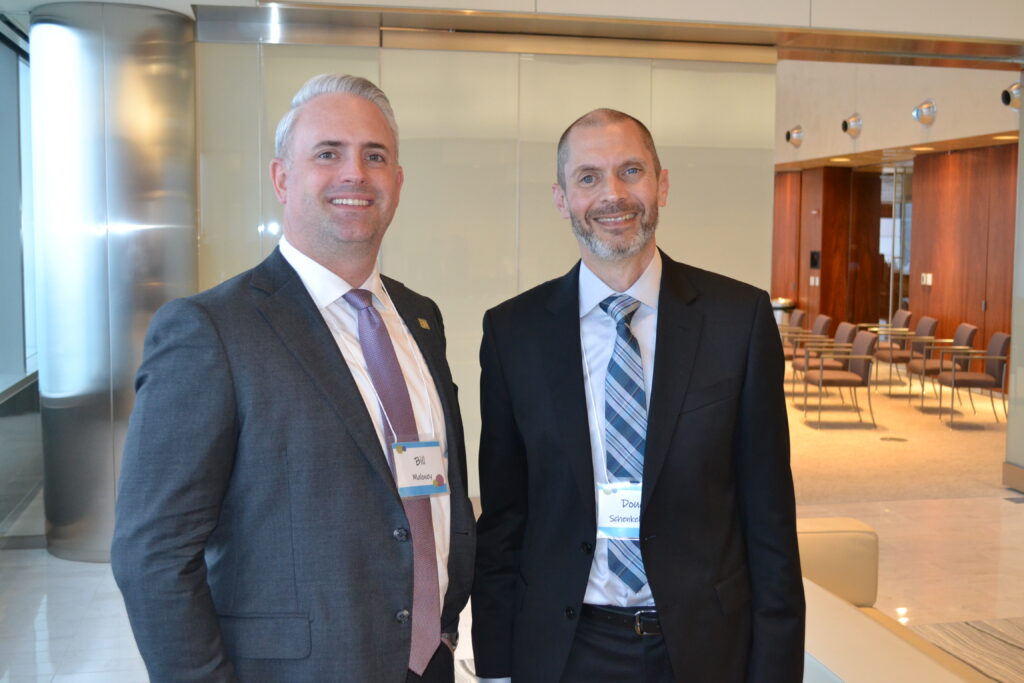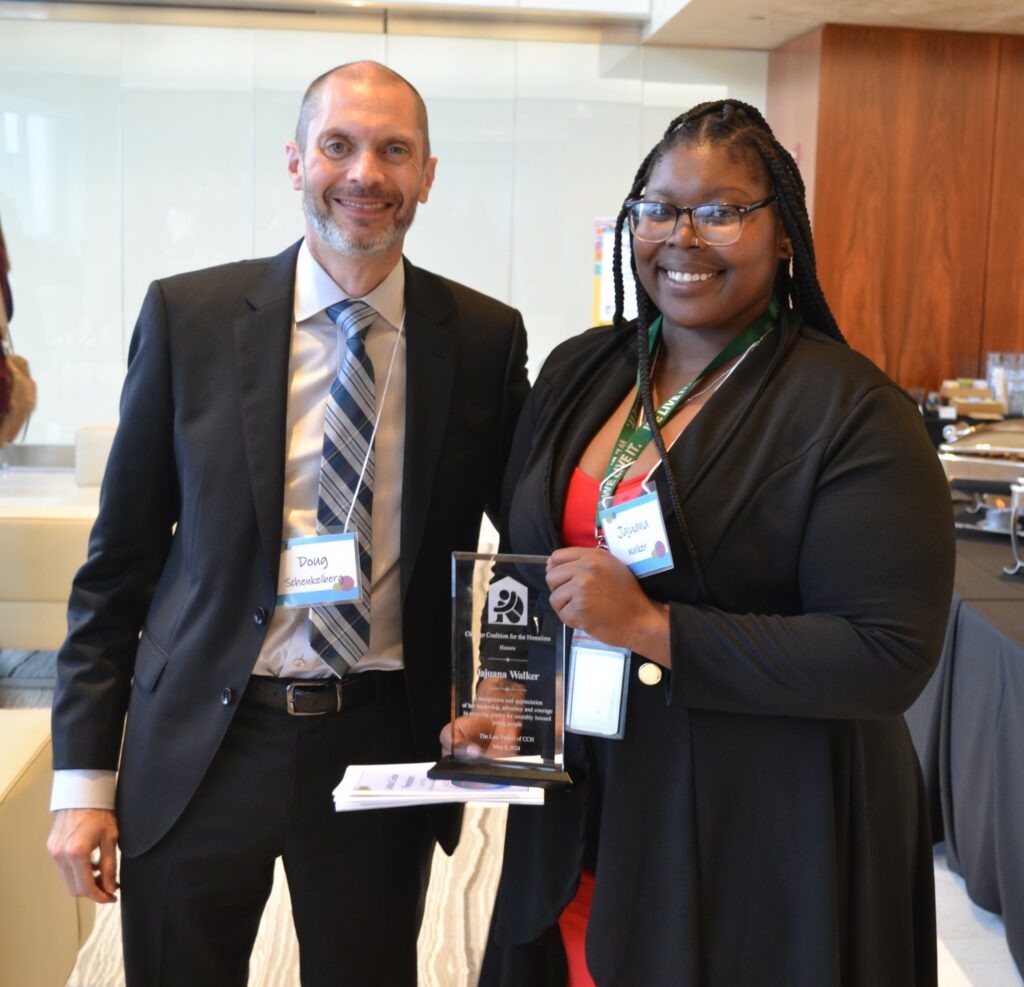“Just because the Supreme Court has overturned this order doesn’t mean cities should just go into a mode of being reactionary and criminalizing people for biological necessities,” she said. “Particularly in Chicago and Illinois, I think there is a recognition that criminalization is not effective. A housing first approach is effective and that seems to be the direction that people here want to move.”
Patricia Nix-Hodes, director of CCH’s The Law Project.
Chicago Tribune: In Chicago’s tent cities, ‘a multitude of challenges’ to address the city’s rising homelessness

Two women, who asked not to be named, tend to a kitten dropped off at their tent encampment at a rail underpass in the 3000 block of West Chicago Avenue on June 25, 2024, in Chicago. (John J. Kim/Chicago Tribune)
Robert Bulanon glanced at the sky and frowned at the rain. He hurried into his home and emerged, holding an umbrella over his head, picking his way between a barbershop pole, a pair of bus seats, a wheelbarrow, a grill where another man was cooking beef stew, and other objects scattered along the embankment of the canal.
Bulanon, 52, is one of about 20 people who live in a set of makeshift shelters along the North Shore Channel between Foster and Bryn Mawr avenues on Chicago’s Northwest Side. A ladder leaned against the chain link fence, separating the river embankment from athletic fields at Northside College Prep, a selective enrollment high school.
By July 30, the residents will no longer be able to call the longtime encampment home. The next day, city departments are scheduled to begin clearing the tents and items, officials said, offering the group non-congregate shelter placement at a downtown hotel. Notices will go up starting the first week of July. The idea of relocating them has been talked about for years.
“They said, ‘We’re here to help; we could send you somewhere, a shelter or something,’” Bulanon recalled of his first interaction with the city.
Months after voters rejected the Bring Chicago Home referendum, which sought to raise millions for homelessness services by raising the city’s real estate transfer tax for property sales above $1 million, Chicago is at a critical juncture on how to address its rapidly growing homeless population.
The city has historically prioritized finding housing for its homeless, many of whom reside in tent cities across its parks and under bridges. But with low affordable housing stock, depleted federal and state funding and other challenges, the city’s number of homeless is outpacing what the city can provide.
CCH’s Response to the Supreme Court’s Decision to Criminalize Street Homelessness

Chicago Coalition for the Homeless (CCH) is deeply disappointed that the U.S. Supreme Court limited the rights of people experiencing homelessness in a decision in the Johnson v. Grants Pass case.
Originating from Grants Pass, Oregon, the Supreme Court decision allows cities to penalize people for sleeping outdoors if they have even a blanket to stay warm, even when they have nowhere else to go. Lower court decisions in the case found that fining and arresting people in those circumstances was “cruel and unusual punishment” under the 8th Amendment of the United States Constitution.
The Court’s decision does not recognize the reality of the lived experience of people who have no place else to go. As noted in the first sentence of Justice Sotomayor’s dissent, “Sleep is a biological necessity, not a crime.”
There is a severe shortage of affordable housing in Chicago, Illinois, and throughout the country and a lack of emergency shelter to address the need. Anti-bedding ordinances, like those at issue in the case, would be particularly harmful to people experiencing homelessness in climates like Chicago and Illinois. Any such measures passed here would punish Black Chicagoans and Illinoisans, who disproportionately experience homelessness.
“Fining and penalizing people experiencing homelessness does not solve homelessness. Indeed, criminalizing homelessness only serves to exacerbate it,” said Patricia Nix-Hodes, Director of the Law Project of CCH. “The solution to homelessness is to provide permanent affordable housing.”
CCH, alongside 27 partner organizations, filed an amicus brief in the case, raising the importance of the case and the impact on people experiencing homelessness in Chicago and Illinois. Pro bono partner Much Shelist supported CCH in filing the brief, and attorneys Steven Blonder, Josh Leavitt, and Charlotte Franklin were instrumental in drafting the brief. Legal Council for Health Justice and Law Center for Better Housing also partnered on the brief.
CCH joined the National Homelessness Law Center and hundreds of other organizations that submitted more than 40 amicus briefs in support of people experiencing homelessness.
Amicus brief partners: AIDS Foundation Chicago, All Chicago Making Homelessness History, BEDS Plus, Inc., Chicago Coalition for the Homeless, Chicago Rehab Network, Chicago Urban League, Chicago Women Take Action, Covenant House Illinois, Deborah’s Place, Farmworker and Landscaper Advocacy Project, Healthcare Alternative Systems, Inc, Heartland Alliance Health, Housing Action Illinois, Illinois Public Health Institute, Impact for Equity, James B. Moran Center for Youth Advocacy, Law Center for Better Housing, Legal Council for Health Justice, LYTE Collective, North Suburban Legal Aid Clinic, Organized Communities Against Deportations, Red Line Service Institute, Safer Foundation, South Suburban PADS, Street Samaritans, The Network: Advocating Against Domestic Violence, The Night Ministry, and Thresholds.
The Return of the Justice Circle
By Michael Nameche, Director of Development
On May 9, supporters and allies of CCH’s Law Project gathered for the Justice Circle reception at the law offices of Baker McKenzie. The event celebrated the 20th anniversary of Youth Futures, CCH’s mobile legal aid clinic for young people experiencing homelessness.
This was the first time that the Justice Circle has held an in-person event since 2019, and CCH is very grateful for all the returning support. Contributions from law firms, banks, and individuals raised over $60,000 to support the Law Project’s work. A list of our sponsors can be found here.
At the event, some special recognition awards were presented. CCH recognized Baker McKenzie’s commitment to helping youth experiencing homelessness nationwide. The firm’s ongoing commitment to authoring Homeless Youth Handbooks has produced a critical resource in 13 states already, with more on the way. Baker McKenzie also partners with the National Network for Youth through their Justice in Action Pro Bono Initiative, which removes barriers that youth experiencing homelessness face when accessing identification documents. Firm partner Michael Lehrman accepted the award on Baker McKenzie’s behalf.
CCH also recognized the ongoing efforts of Jajuana Walker, a former Law Project client and homeless youth advocate. Jajuana took her own personal struggles with housing insecurity, first experiencing homelessness at the age 18, and channeled her courage and wisdom into advocating to end housing discrimination and youth homelessness in Chicago. Jajuana fought against multiple barriers to housing access by serving as a plaintiff in successful housing discrimination and fair credit cases with CCH.
Associate Director of the Law Project, Beth Malik, had this to say when presenting the award to Jajuana: “I had the privilege of working with Jajuana on both her housing and fair credit cases. The litigation was long, complicated, and mentally and emotionally taxing. During the process, despite many ups and downs over the course of 3 years, she never wanted to give up. She wanted to keep going not for herself, but to make sure that other homeless young people have better access to stable and long-term housing.”
CCH is especially grateful to our event host, Baker McKenzie, for providing their fabulous space and handling all the event details so CCH could spend the evening focusing on the community of support that showed up.
Joan Esposito: CCH’s Law Project and the SCOTUS

Joan Esposito hears from Camilla Krauss, CCH Staff Attorney of the Law Project. Tune in at 1:41.
Oral Arguments Begin in Johnson v. Grants Pass Case, Determining the Constitutionality of Criminalizing Homelessness
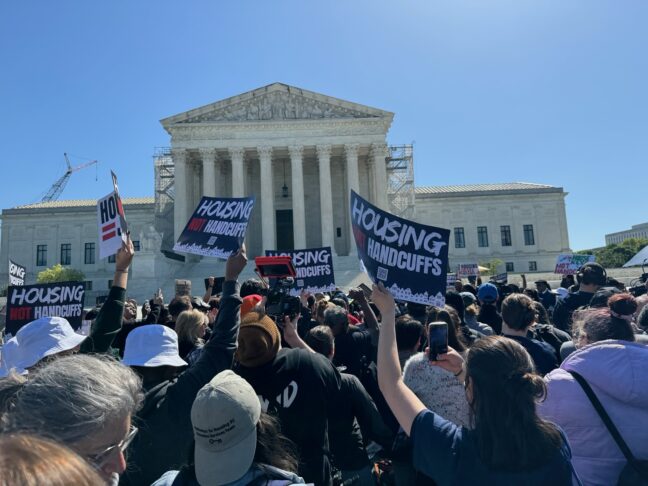
By Sam Paler-Ponce, interim associate director of policy
On Monday, April 22, 2024, the U.S. Supreme Court began oral arguments in Johnson v. Grants Pass, a case deciding if cities have the right to penalize people experiencing homelessness for sleeping outdoors.
Listen to the oral argument by clicking here.
The City of Grants Pass argues the city is just following the trend of most other cities, as many cities across the country are already arresting and fining people experiencing homelessness. However, Grants Pass has taken the most extreme posture: there is nowhere, at no time, where people living outside can sleep with things like a blanket or pillow.
Cruel and Unusual Punishment
At the heart of Johnson v. Grants Pass lies the interpretation of constitutional protections against cruel and unusual punishment. In 1962, the Supreme Court weighed in on a similar issue in the case of Robinson v. California. The case struck down a California law that made it a crime to “be addicted to the use of narcotics.”
The court held that the law may not criminalize someone’s status as a person with a substance use disorder and must instead target some kind of criminal act. Therefore, a state may punish a person for the illegal purchase, sale, or possession of narcotics, and—absent any evidence of illegal drug use— the state of California could not punish someone simply for existing with a substance use disorder.
Martin v. Boise
The 2018 case of Martin v. Boise challenged the city of Boise’s enforcement of camping and disorderly conduct ordinances against persons experiencing homelessness—those who need to sleep in public in the absence of adequate housing or shelter.
Now six years ago, the U.S. Supreme Court denied a petition by the city of Boise to review the case Martin v. Boise (formerly Bell v. Boise). This leaves in place earlier rulings under the U.S. Court of Appeals for the Ninth Circuit, which held that people experiencing street homelessness could no longer be arrested simply because they are homeless.
Dozens of court cases have since cited Martin v. Boise, including courts in Florida, Missouri, New York, Ohio, Texas, and Virginia.
Criminalizing Homelessness
As the U.S. Supreme Court prepares to deliberate on this landmark case, the outcome holds significant implications for the quarter of a million people nationwide who find themselves without shelter on any given night. While the case of Johnson v. Grants Pass serves as a focal point for legal debate, it also highlights the systemic failures that perpetuate homelessness nationwide.
In Grants Pass, people are issued $295 tickets for using a blanket to stay warm when they have nowhere else to go. Punitive measures like incarceration and fines exacerbate the issue, rather than resolve it. The real solution lies in ensuring safe, decent, and affordable housing.
Local Insight
Over 1,000 organizations and public leaders across the country have filed more than 40 amicus briefs (“amici”) in support of Gloria Johnson and homeless rights in the landmark case.
An amicus brief is submitted by a person or group not directly involved in a legal case but is permitted to support the court by providing information, expertise, or insight relevant to the case. These briefs, known as “amici,” aim to inform the court about potential public policy consequences of a ruling.
Chicago Coalition for the Homeless, alongside 27 partner organizations, filed an amicus brief, raising the importance of the case and the impact on people experiencing homelessness in Chicago and Illinois.
The U.S. Supreme Court is expected to take a position by June 2024.
View the transcript of the argument by clicking here.
Chicago Coalition for the Homeless and partners weigh in on high-profile U.S. Supreme Court case, Johnson v. Grants Pass
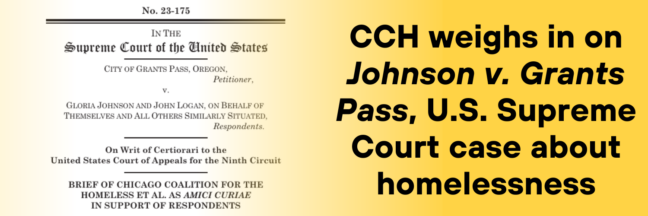
By Sam Paler-Ponce, interim associate director of policy
Chicago Coalition for the Homeless assembled 27 statewide partner organizations in filing an amicus brief in the upcoming case of Johnson v. Grants Pass. On the docket to be heard for oral arguments on April 22, 2024, this will be the first time in decades that the U.S. Supreme Court is hearing a case related to homelessness.
“Homelessness is not something you can sweep under the rug. It needs to be solved in a positive way,” said Robert Henderson, a grassroots leader with Chicago Coalition for the Homeless. “Punishing a person for being homeless is cruel and unusual, and it is not right.” Henderson was living on the street when he first worked with Chicago Coalition for the Homeless as a legal client. In 2018, he became the first person to successfully bring a case under the Illinois Homeless Bill of Rights.
Originating from Grants Pass, Oregon, the Supreme Court will determine if cities have the right to penalize people for sleeping outdoors if they have even a blanket to stay warm, particularly when they have nowhere else to go. At the heart of the matter lies the interpretation of constitutional protections against cruel and unusual punishment.
“The best solutions to the homelessness crisis in this country are creating sufficient affordable housing and providing supporting social services to help individuals stay housed,” said Camilla Krauss, a drafting attorney on the brief. “Criminalizing a person experiencing homelessness for simply existing in the elements not only creates bad precedent but also serves to exacerbate, rather than solve, the core issues.”
“Homelessness is a public health and affordable housing crisis, requiring urgent, meaningful and collaborative action across many sectors. Fines and jailing are traumatizing to people experiencing homelessness and disrupt work towards real solutions,” said Lisa Parsons, Legal Director at Legal Council for Health Justice and a drafting attorney on the brief.
The case challenges the practice of cities like Grants Pass, which resorted to penalizing people sleeping in public spaces with bedding, such as a blanket, despite the absence of shelter in the community.
Chicago Coalition for the Homeless (CCH), alongside 27 partner organizations, filed an amicus brief (relating to amicus curiae, meaning “friend of the court”), raising the importance of the case and the impact on people experiencing homelessness in Chicago and Illinois. Pro bono partner Much Shelist supported CCH in filing the brief, and attorneys Steven Blonder, Josh Leavitt, and Charlotte Franklin were instrumental in drafting the brief.
“The measure of a society is how it treats its most vulnerable. It demonstrates the character and compassion of the citizenry, and our country has made significant advances in the care and sheltering of those experiencing homelessness,” said Steve Blonder, principal at Much Shelist. “A reversal of the Ninth Circuit’s decision would be a major step backward – to a society less caring and more medieval.”
“With homelessness and evictions most seriously impacting Black Americans, criminalizing homelessness is an additional way to make living while Black illegal and must be stopped if we are ever to attain a just society,” said Michelle Gilbert, Legal and Policy Director at the Law Center for Better Housing, a drafting organization on the brief.
“A negative outcome in this case would exacerbate the challenges faced by people living with HIV and other chronic conditions who are also experiencing homelessness, creating additional barriers to accessing the support and services they need to transition out of homelessness and manage their chronic health conditions,” said Nadeen Israel, Senior Vice President of Policy and Advocacy at AIDS Foundation Chicago.
While the case of Johnson v. Grants Pass serves as a focal point for legal debate, it also highlights the systemic failures that perpetuate homelessness nationwide. Punitive measures like incarceration and fines exacerbate the issue, rather than resolving it. The real solution lies in ensuring safe, decent, and affordable housing.
“This case could affect the thousands of Illinois survivors seeking shelter and create further barriers to accessing safe housing,” said Jaclyn Zarack-Koriath, Director of Housing Advocacy at The Network: Advocating Against Domestic Violence.
As the Supreme Court prepares to deliberate on this landmark case, the outcome holds significant implications for the quarter of a million people nationwide who find themselves without shelter on any given night.
“An adverse outcome in this case could make the families we serve even more vulnerable and unstable,” said Karen Freeman-Wilson, Chief Executive Officer at Chicago Urban League, an advocacy organization that works to achieve equity for Black families and communities through social and economic empowerment.
CCH joins the National Homelessness Law Center and hundreds of other organizations that have submitted 39 amicus briefs in support of people experiencing homelessness.
Amicus brief partners: AIDS Foundation Chicago, All Chicago Making Homelessness History, BEDS Plus, Inc., Chicago Coalition for the Homeless, Chicago Rehab Network, Chicago Urban League, Chicago Women Take Action, Covenant House Illinois, Deborah’s Place, Farmworker and Landscaper Advocacy Project, Healthcare Alternative Systems, Inc, Heartland Alliance Health, Housing Action Illinois, Illinois Public Health Institute, Impact for Equity, James B. Moran Center for Youth Advocacy, Law Center for Better Housing, Legal Council for Health Justice, LYTE Collective, North Suburban Legal Aid Clinic, Organized Communities Against Deportations, Red Line Service Institute, Safer Foundation, South Suburban PADS, Street Samaritans, The Network: Advocating Against Domestic Violence, The Night Ministry, and Thresholds.
Nia remembers her roots as she spreads her wings

Nia Hill wants you to know that the West Side of Chicago has great people who do great things. Born and raised in Chicago’s North Lawndale neighborhood, she also understands first-hand the barriers that residents in these systemically marginalized communities face.
“A quick Google search tells you what you want to know,” said Nia on where she grew up, noting the prevalence of violence and poverty caused by institutional racism.
Nia’s family experienced homelessness when she was in high school after losing their Section 8 voucher. They “bounced around a lot” – staying with an aunt, people from church, and hotels before eventually settling into stable housing.
“It was a humbling experience,” she recalls, “learning how to do without a place you would normally consider home.”
Continue reading Nia remembers her roots as she spreads her wings
Preschool Enrollment Support
Did you know? If you or your child is living in a shelter or another temporary living situation, your child can receive priority placement in Chicago Public Schools’ (CPS) preschool programs and preschool programs funded by the City of Chicago. Your child can be enrolled in preschool without proof of address, income, guardianship, or other documents normally needed for enrollment.
Chicago families with preschool-age children can enroll in preschool starting April 9 for the 2024-25 school year.
If your child is 4 years old on or before September 1, 2024, they are eligible for CPS full-day and half-day programs. If your child is 3 years old on or before September 1, 2024, they are eligible for CPS half-day programs and Community Based Programs.
Continue reading Preschool Enrollment SupportSNAP Emergency Allotments Ending
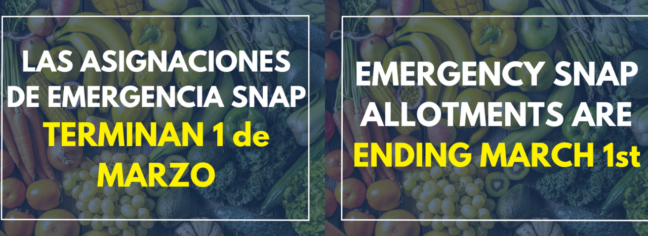
The Illinois Department of Human Services (IDHS) has announced that Supplemental Nutrition Assistance Program (SNAP) benefits will return to pre-pandemic levels beginning in March 2023. Illinois will sustain emergency SNAP benefits through February, but the federal increases will end on March 1, 2023.
With the end of emergency benefits, SNAP participants will see benefits reduced. The reduction in SNAP benefits is a result of a federal policy change, not because of changes in individual SNAP cases.
Since April 2020, all Illinois SNAP households received both the regular monthly benefit and an emergency SNAP allotment. Beginning on March 1, 2023, each SNAP household will only receive benefits based on factors like household size, income, and deductions. This means that the decrease in the benefit amounts will depend on each household’s size and financial circumstances.
All SNAP recipient households will receive a client notice listing the amount of benefits they will receive.
IDHS has also put together a resource page to help SNAP households with the transition. Customers will receive their regular normal SNAP benefits through their Electronic Benefit Transfer (EBT) card beginning in March 2023 on their regularly scheduled issuance date.
To prepare for this change, IDHS recommends SNAP customers visit www.abe.illinois.gov and update their account if there is a change in address, increase in housing costs, or decrease in income. This will ensure that SNAP households are receiving their maximum benefits.
If you have any questions regarding public benefits such as SNAP, TANF, or Medicaid, please contact Venus Rivera, Public Benefits Specialist at the CCH Law Project, by email at venus@chicagohomeless.org or call (312) 720-1800.
Find a Food Pantry
Sobre el fin de las asignaciones de emergencia de SNAP (borrador)
Febrero de 2023
El Departamento de Servicios Humanos de Illinois (Illinois Department of Human Services, IDHS) ha anunciado que los beneficios del Programa Suplementario de Asistencia Nutricional (Supplemental Nutrition Assistance Program, SNAP) volverán a los niveles anteriores a la pandemia a partir de marzo de 2023. Illinois mantendrá los beneficios de emergencia del SNAP hasta febrero, pero los aumentos federales finalizarán el 1 de marzo de 2023.
Con el fin de los beneficios de urgencia, los participantes del SNAP verán reducidos sus beneficios. La reducción de los beneficios del SNAP se debe a un cambio en la política federal, no a cambios en los casos individuales del SNAP.
Desde abril de 2020, todos los hogares SNAP de Illinois recibieron tanto el beneficio mensual regular como una asignación SNAP de emergencia. A partir del 1 de marzo de 2023, cada hogar SNAP sólo recibirá beneficios basados en factores como el tamaño del hogar, los ingresos y las deducciones. Esto significa que la reducción del monto de los beneficios dependerá del tamaño de cada hogar y de sus circunstancias económicas.
Todos los hogares beneficiarios del SNAP recibirán un aviso de cliente en el que se indicará el monto de los beneficios que recibirán.
El IDHS también ha creado una página de recursos para ayudar a los hogares SNAP con la transición. Los clientes recibirán sus beneficios normales de SNAP a través de su tarjeta de Transferencia Electrónica de Beneficios (Electronic Benefit Transfer, EBT) a partir de marzo de 2023 en su fecha de emisión regular programada.
Para prepararse para este cambio, el IDHS recomienda a los clientes de SNAP visitar www.abe.illinois.gov y actualizar su cuenta si hay un cambio de dirección, aumento de los costos de vivienda o disminución de los ingresos. Esto garantizará que los hogares beneficiarios del SNAP reciban el beneficio máximo.
Si tiene alguna pregunta sobre beneficios públicos como SNAP, TANF o Medicaid, póngase en contacto con Venus Rivera, Especialista en Prestaciones Públicas del CCH Law Project, por correo electrónico en la dirección venus@chicagohomeless.orgo por teléfono al(312) 720-1800.
Para más información, visite www.abe.illinois.gov/abe/access.
Encuentre una despensa de alimentos local en Illinois: https://eat-move-save.extension.illinois.edu/#food-finder
Encuentre una despensa de alimentos local en Chicago: www.chicagosfoodbank.org/findfood

